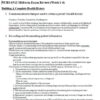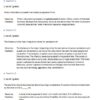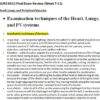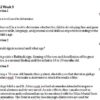Description
NURS 6521N Midterm Exam – Advanced Pharmacology (99 out of 100 points)
- A 79-year-old woman with a medical history that includes osteoporosis has recently moved to a long-term care facility. Medication reconciliation indicates that the woman has been taking calcitonin, salmon for several years. The nurse should recognize that the most likely route for the administration of this drug is
- A woman with an inflammatory skin disorder has begun taking prednisone in an effort to control the signs and symptoms of her disease. The nurse who is providing care for this patient should prioritize which of the following potential nursing diagnoses in the organization of the patient’s care?
- A 76-year-old woman has a complex medical history that includes emphysema, osteoporosis, malnutrition, and hypothyroidism. Recently, the woman fell outside her home as a result of weakness and suffered a fracture to her femoral head. The woman’s subsequent hip-replacement surgery has been scheduled and the care team recognizes that the use of isoflurane will be most significantly influenced by
- It is determined that a patient, who is in a hepatic coma, needs a laxative. Lactulose is prescribed. Which of the following should the nurse monitor to assess the efficacy of the lactulose therapy?
- A 57-year-old male patient who has been prescribed doxorubicin for small-cell lung cancer is advised by the nurse to avoid taking aspirin or drugs that contain aspirin because it may
- A man who smokes one pack of cigarettes daily has been diagnosed with chronic bronchitis. He has been prescribed theophylline by his family doctor. What effect will the patient’s smoking status have on the therapeutic use of theophylline?
- The nurse is caring for a patient receiving an aminoglycoside (antibiotic) that can be nephrotoxic. Which of the following will alert the nurse that the patient may be experiencing nephrotoxicity?
- A 39-year-old African-American male is 25 pounds overweight and has been diagnosed with hypertension after three consecutive above-normal blood pressure readings. The most likely initial drug therapy for this patient will be
- A nurse is teaching an older adult patient about polypharmacy. Which of the following statements best describe this term?
- Which of the following affects drug distribution throughout the body?
- A patient who has been taking buspirone (BuSpar) for 1 week calls the clinic and reports to the nurse that the drug is not working. The patient informs the nurse that she is still having symptoms of anxiety. The nurse will tell the patient that
- A patient who has ongoing pain issues has been prescribed meperidine (Demerol) IM. How should the nurse best administer this medication?
- A nurse working for a drug company is involved in phase III drug evaluation studies. Which of the following might the nurse be responsible for during this stage of drug development?
- A nurse will monitor which of the following when assigned to a patient taking allopurinol for chronic gout who visits the clinic every 2 months?
- A patient with diabetes has had a cough for 1 week and has been prescribed a cough syrup (an expectorant). What special instructions should the nurse include in the patient teaching for this situation?
- A patient has been prescribed lithium therapy. Which of the following signs and symptoms will the nurse tell the patient to report immediately?
- A nurse is administering drugs to a 70-year-old patient who has a reduced plasma albumin level. When assessing the patient for therapeutic outcomes of drug therapy, the nurse will also be careful to observe for
- A 29-year-old woman has been prescribed alosetron (Lotronex) for irritable bowel syndrome. Before starting the drug therapy, the nurse will advise the patient about which of the following adverse effect(s)?
- In response to a patient’s nausea, the nurse has mixed a dose of an antiemetic with 50 mL of sterile normal saline and will administer the dose by IV piggyback. What is the rationale for the use of IV piggyback?
- A nurse is assigned to a patient who is receiving IV aminophylline. The nurse is aware that the IV infusion rate should be
- In which of the following patients would a nurse expect to experience alterations in drug metabolism?
- A 58-year-old man is admitted to the emergency department. A diagnosis of severe digoxin toxicity is made. Bradycardia is present, and an electrocardiogram (ECG) confirms toxicity. The nurse will administer which of the following drugs?
- A nurse is aware that diphenoxylate HCl with atropine sulfate is an effective adjunct in the treatment of diarrhea. For which of the following patients could the administration of this drug be potentially harmful?
- A patient is in the clinic for seasonal allergic rhinitis. Loratadine (Claritin) is prescribed. Which of the following statements will the nurse include when providing patient education concerning this drug?
- A 72-year-old man is taking Adderall XR for the treatment of narcolepsy. He is currently having problems with not being able to swallow large tablets or capsules. The man also wears dentures, which makes it even more difficult for him to swallow medication. He is in the clinic to talk to the nurse about his problem. The nurse will instruct him to
- A 72-year-old man who is unable to sleep since admission into the hospital is given a hypnotic medication at 9 p.m. The nurse finds the patient drowsy and confused at 10 a.m. the next day. The nurse is aware that this behavior is most likely due to
- A 40-year-old woman with a diagnosis of fibromyalgia has been prescribed cyclobenzaprine (Flexeril) as an adjunct to her existing drug regimen. What nursing diagnosis should the nurse prioritize when updating the nursing care plan for this patient?
- A nurse works in a sleep disorder clinic and is responsible for administering medications to the patients. Which of the following patients would be most likely to receive zaleplon (Sonata)?
- During a clinic visit, a patient complains of having frequent muscle cramps in her legs. The nurse’s assessment reveals that the patient has been taking over-the-counter laxatives for the past 7 years. The nurse informed the patient that prolonged use of laxatives
- Mr. Nguyen, age 71, will soon be discharged home from the hospital after a successful coronary artery bypass graft (CABG). During patient education about his drug regimen, Mr. Nguyen’s nurse should prioritize teach about
- A nurse has been administering a drug to a patient intramuscularly (IM). The physician discontinued the IM dose and wrote an order for the drug to be given orally. The nurse notices that the oral dosage is considerably higher than the parenteral dose and understands that this due to
- A male patient with a diagnosis of relapsing-remitting multiple sclerosis is in the clinic to discuss with the nurse the possibility of self-administration of glatiramer. During the patient education session for self-administration, the nurse will emphasize
- A 57-year-old man is to begin 5-FU therapy for colon cancer. It will be most important for the nurse to monitor which of the following during the first 72 hours of the initial treatment cycle?
- A middle-aged patient was diagnosed with major depression after a suicide attempt several months ago and has failed to respond appreciably to treatment with SSRIs. As a result, his psychiatrist has prescribed phenelzine. When planning this patient’s subsequent care, what nursing diagnosis should the nurse prioritize?
- These drugs have a potential for abuse, but the potential is lower than for drugs on Schedule 2. These drugs contain a combination of controlled and noncontrolled substances. Use of these drugs can cause a moderate to low physiologic dependence and a higher psychological dependence. A verbal order can be given to the pharmacy and the prescription can be refilled up to five times within 6 months. Examples include certain narcotics (codeine) and nonbarbiturate sedatives. This is scheduled drug
- The wife of a patient who is taking haloperidol calls the clinic and reports that her husband has taken the first dose of the drug and it is not having a therapeutic effect. An appropriate response by the nurse would be
- Mrs. Houston is a 78-year-old woman who resides in an assisted living facility. Her doctor prescribed digoxin at her last visit to the clinic and she has approached the nurse who makes regular visits to the assisted-living facility about this new drug. What teaching point should the nurse emphasize to Mrs. Houston?
- A nurse is caring for a patient who abuses marijuana. The treatment for marijuana abuse consists mainly of
- 5 ml = _______________tsp
- A nurse is caring for a patient who is admitted into the cardiac care unit with acute, decompensated heart failure. Nesiritide (Natrecor) has been ordered. When preparing for administration of the drug, the nurse will
- A nurse who provides care in a long-term care facility is documenting a new resident’s medication regimen on the resident’s intake admission. The nurse is documenting the generic, rather than proprietary, names of the resident’s current drugs because
- During long-term desmopressin therapy in a 48-year-old woman, it will be most important for the nurse to assess which of the following?
- The nurse practitioner orders Amoxicillin 250 mg/5 ml tid for 10 days? The nurse practitioner would expect the pharmacist to fill the prescription bottle with how many ml?
- A patient has taken an overdose of a vitamin/mineral supplement containing magnesium. The nurse will be sure to assess
- A nurse is instructing a patient who was recently diagnosed with multiple sclerosis about dantrolene (Dantrium). The patient is a 38-year-old-male and the foreman for a construction company. In order to minimize one important adverse effect of the drug, the nurse will give the patient which of the following instructions?
- A 52-year-old man is suffering from a deficiency of exocrine pancreatic secretions and is prescribed pancrelipase (Pancrease MT). Before the medication therapy begins, the nurse will assess for allergies related to
- A 46-year-old white American has been prescribed a drug that binds to acid glycoproteins. The nurse understands that white Americans usually receive
- A nurse is creating a plan of care for a 68-year-old woman with a recent diagnosis of unstable angina and new prescription for nitroglycerin. Which of the following nursing diagnoses should the nurse prioritize in the planning of this patient’s care?
- A patient with type 1 diabetes has been admitted to the hospital for orthopedic surgery and the care team anticipates some disruptions to the patient’s blood glucose levels in the days following surgery. Which of the following insulin regimens is most likely to achieve adequate glycemic control?
- A 29-year-old female patient has been prescribed orlistat (Xenical) for morbid obesity. The nurse is providing patient education concerning the drug. An important instruction to the patient would be to
- A patient with bronchial asthma is prescribed a sustained-release preparation of theophylline. To help minimize the adverse effects of the drug, which of the following should the nurse suggest?
- A woman with numerous chronic health problems has been diagnosed with a benign gastric ulcer has begun treatment with ranitidine (Zantac). Which of the following teaching points should the nurse provide to this patient?
- A nurse is teaching a patient about his newly prescribed drug, colchicine, for gout. The nurse will instruct the patient to avoid which of the following foods?
- A patient has been prescribed several drugs and fluids to be given intravenously. Before the nurse starts the intravenous administration, a priority assessment of the patient will be to note the
- A patient receives 25 units of NPH insulin at 7.AM. At what time of day should the nurse advise the patient to be most alert for a potential hypoglycemic reaction?
- The nurse practitioner orders Amoxicillin 500 mg tid? What is the total amount of medication patient will take per day?
- Mr. Tan is a 69-year-old man who prides himself in maintaining an active lifestyle and a healthy diet that includes adequate fluid intake. However, Mr. Tan states that he has experienced occasional constipation in recent months. What remedy should be the nurse’s first suggestion?
- A postsurgical patient has been provided with a morphine patient-controlled analgesic (PCA) but has expressed her reluctance to use it for fear of becoming addicted. How can the nurse best respond to this patient’s concerns?
- A female patient with a diagnosis of type 1 diabetes mellitus has been experiencing increasing neuropathic pain in recent months, a symptom that has not responded appreciably to conventional analgesics. The patient’s care provider has begun treatment with gabapentin (Neurontin). How is the addition of this drug likely to influence the management of the patient’s existing drug regimen?
- A nurse who is working with an older adult patient who takes eight medications a day wants to promote medication adherence. Which of the following nursing interventions would best promote medication adherence?
- A community health nurse is performing a home visit to an elderly client who receives twice-weekly wound care. The client has mentioned that she has been having difficulty sleeping, a problem that she has not previously experienced. Which of the following measures should the nurse suggest?
- A high school student was diagnosed with asthma when he was in elementary school and has become accustomed to carrying and using his “puffers”. In recent months, he has become more involved in sports and has developed a habit of administering albuterol up to 10 times daily. The nurse should teach the student that overuse of albuterol can lead to
- A 70-year-old patient has just started taking lorazepam 10 days ago for anxiety issues related the death of her husband. She is staying with her daughter for a couple of weeks. The patient’s daughter has noticed that her mother is having difficulty walking and seems to be confused at times and calls the clinic to report this to the nurse. The nurse will inform the daughter that
- A patient will begin three new medications as part of her treatment plan. The nurse practitioner understands that proper disposal of medications is key when the nurse practitioner states
- Children age 6 to 11 are recommended to start with what dosage of Allegra?
- A nurse is caring for a male patient who has a spinal cord injury due to a motorcycle accident. He has been taking dantrolene (Dantrium) for 2 weeks. The nurse will monitor which of the following?
- The nurse is performing patient education for a woman who will soon begin treatment of hyperlipidemia with simvastatin (Zocor). The patient has asked the nurse if there are any “bad side effects” that she should be aware of. Which of the following statements should underlie the nurse’s response?
- A nurse is assigned to a patient who is taking lithium. Which of the following drug serum levels would indicate that the patient is at risk for adverse effects of the drug?
- A patient is suffering from acute inhalant intoxication. The priority nursing intervention will be to
- A patient with a recent diagnosis of acute renal failure has a long-standing seizure disorder which has been successfully controlled for several years with antiseizure medications. The nurse should recognize that the patient’s compromised renal function will likely
- A priority nursing assessment for a patient who is to receive an alpha- or beta-adrenergic antagonist would be to
- After a recent history of shortness of breath that has become increasingly severe, a woman has been prescribed ipratropium by MDI while she undergoes a diagnostic workup. What patient teaching should the nurse provide to this patient?
- A patient has been prescribed 1 mg lorazepam (Ativan) sublingual prior to the scheduled insertion of a peripherally inserted central (PIC) line. How should the nurse direct the patient when administering this medication?
- A 73-year-old woman has scheduled an appointment with her nurse practitioner to discuss her recurrent constipation. The woman states that she experiences constipation despite the fact that she takes docusate on a daily basis and performs cleansing enemas several times weekly. How should the nurse best respond to this patient’s statements?
- A nurse has been invited to speak to a support group for persons with movement disorders and their families. Which of the following statements by the nurse addresses the chronic nature of these diseases and the relevant drug therapies?
- To maximize the therapeutic effect of diphenoxylate HCl with atropine sulfate, the nurse will instruct the patient to take the medication
- A patient has been prescribed a drug that can be self-administered at home. Which of the following would be the most important information for the nurse to relate to the patient concerning self-administration of a drug?
- A home health nurse notes that there have been changes to a patient’s oral drug regimen. The nurse will closely monitor the new drug regimen to
- An elderly patient with a history of congestive heart failure has been admitted to hospital with failure to thrive and admission blood work reveals a hemoglobin level of 6.9 g/dL. The care team has consequently administered two units of packed red blood cells, but auscultation of the client’s lungs now reveals diffuse crackles. Administration of what drug is likely to resolve the patient’s pulmonary edema?
- A patient with a diagnosis of nonsmall cell lung cancer is currently undergoing chemotherapy. At the encouragement of a family member, the patient has announced to the nurse his intention to complement this treatment with a regimen of herbal remedies. How should the nurse respond to this patient’s statement?
- 30 ml = _______________tbsp
- A patient has been prescribed zolpidem (Ambien) for short-term treatment of insomnia. Which of the following will the nurse include in a teaching plan for this patient? (Select all that apply.)
- A 68-year-old man complains of a chronic, nonproductive cough. He states that he has to have relief, that he has been coughing every 2 to 3 minutes, and he is worn out. Dextromethorphan is prescribed for him. Before he leaves the clinic he asks how long it will take for the medicine to work. The nurse will advise him that he should experience therapeutic effects in
- A nurse is instructing a patient concerning a newly prescribed drug. Which of the following should be included to help improve patient compliance and safety?
- A patient who has been admitted to the hospital for a mastectomy has stated that she has experienced adverse drug effects at various times during her life. Which of the following strategies should the nurse prioritize in order to minimize the potential of adverse drug effects during the patient’s stay in the hospital?
- An elderly man has been admitted to a residential care facility and the nurse has conducted a medication reconciliation. The man has taken numerous drugs in the past, including a course of bicalutamide (Casodex) several years earlier. The nurse recognizes this drug as being an antiandrogen and is consequently justified in presuming that the man has a history of what disease?
- A 70-year-old woman has a complex medical and a current drug regimen that includes calcium and vitamin D supplements for osteoporosis, metformin (Glucophage) for type 2 diabetes, phenelzine (Nardil) for depression, and metoprolol (Lopressor) and furosemide (Lasix) for hypertension. The woman is requesting dextromethorphan for the treatment of a recurrent cough. What component of her drug regimen contraindicates the use of dextromethorphan?
- Several months of treatment with a statin accompanied by lifestyle modifications have failed to appreciably improve a patient’s cholesterol levels. Consequently, the patient has been prescribed cholestyramine. The nurse should recognize that this drugs achieves its therapeutic effect by
- A nurse is assessing a patient who has come to the emergency department complaining of back spasms. The patient states that he has a history of opioid addiction and does not want to take any drug that “puts me at risk of becoming physically dependent.” Which of the following medications would the nurse question, if ordered?
- A 24-year-old factory worker has been prescribed guaifenesin for the first time. Which of the following will be a priority assessment by the nurse before the patient’s first dose?
- A 90-year-old frail, elderly woman has arrived at the emergency department with a broken hip and in acute respiratory distress. Succinylcholine will be used because of the need for rapid endotracheal intubation, and then the woman will be sent to surgery. Due to the woman’s frail condition, she is at risk for skin breakdown. Which of the following nursing diagnoses would be most appropriate?
- Drugs have a high potential for abuse. There is no routine therapeutic use for these drugs and they are not available for regular use. They may be obtained for “investigational use only” by applying to the U.S. Drug Enforcement Agency. Examples include heroin and LSD. Which scheduled drug is this?
- A 47-year-old woman has been diagnosed with open-angle glaucoma. Pilocarpine drops are prescribed. The nurse’s assessment reveals that the patient has worn soft contact lenses for 15 years. The nurse will instruct the patient to
- A 70-year-old woman with a history of atrial fibrillation takes digoxin and verapamil to control her health problem. Verapamil achieves a therapeutic effect by
- A nurse will instruct a patient taking allopurinol to take each dose
- A 43-year-old woman was diagnosed with multiple sclerosis 2 years ago and has experienced a recent exacerbation of her symptoms, including muscle spasticity. Consequently, she has been prescribed Dantrolene (Dantrium). In light of this new addition to her drug regimen, what teaching point should the woman’s nurse provide?
- A nurse is caring for a 92-year-old patient who is taking multiple drugs and displaying increased cognitive impairment and memory loss. The initial action of the nurse would be to
- A 64-year-old-patient has been prescribed lorazepam (Ativan) because of increasing periods of anxiety. The nurse should be careful to assess for
- A 70-year-old woman who is on long-term ibuprofen therapy for osteoarthritis has returned to the clinic for her regular 6-month visit. In the last couple of months, she has been having increasing periods of abdominal pain. The nurse suspects that this pain may be related to
- Which of the following would be the most important safety-related instruction for a nurse to give to a patient taking baclofen (Lioresal)?









